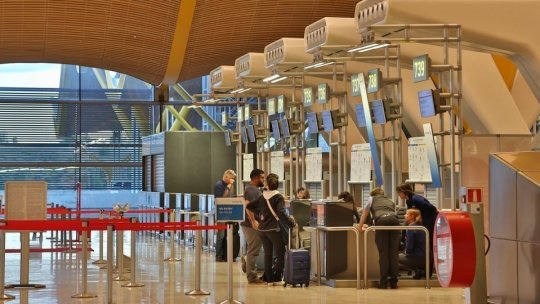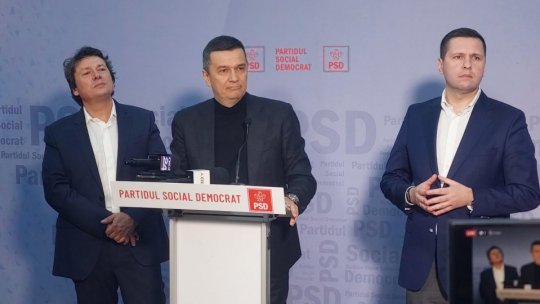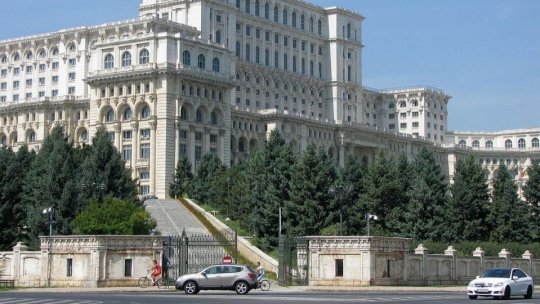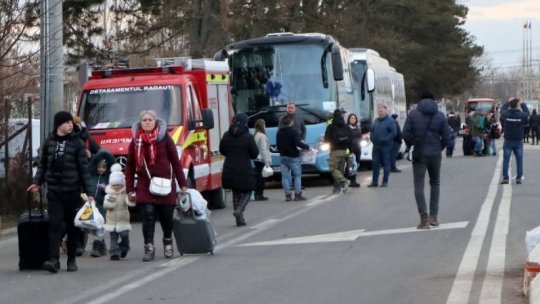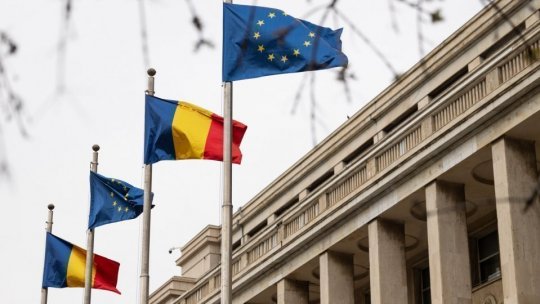Romanian Army and NATO
2017 has been an important year for the Romanian Army, that needed to adapt to the new challenges to Euro-Atlantic security.
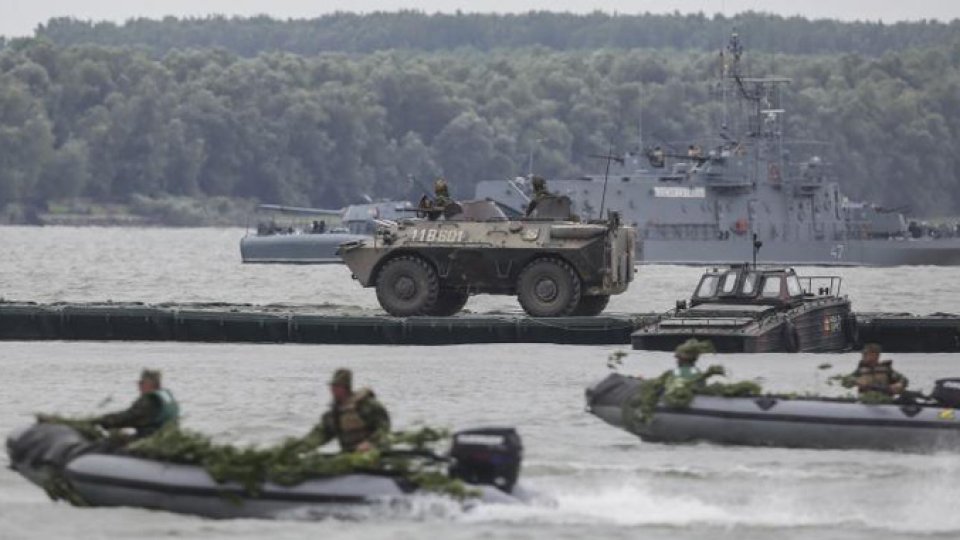
21 Noiembrie 2017, 16:24
2017 has been an important year for the Romanian Army, that needed to adapt to the new challenges to Euro-Atlantic security. Romanian General Army Staff is reorganized under the name of the Romanian Defense Staff , with new Commands for Cyber Defense and for Special Forces. In the field of endowment with military technique, eight important projects targeting the endowment of the Romanian Army until 2026 were approved, out of which the acquisition of anti-aircraft defense systems and 8x8 armored conveyors entered in a straight line.
RRA Military Reporter Radu Dobriţoiu discussed about the modernization of the Romanian Army and its adaptation to the new Euro-Atlantic security challenges with experts in the field, in a recent „Euroatlantica” radio show of Radio Romania News (Radio Romania Actualităţi RRA), that included an exclusive interview with the Chief of the Romanian General Staff, Gen.Nicolae Ciucă, and where special guests in the studio were Brigadier General Daniel Petrescu, Commander of the NATO Multinational Division South East in Bucharest, and Colonel Mircea Gologan, Commander of the 81st Mechanised Brigade "General Grigore Bălan" from Bistriţa.
Radu Dobriţoiu: General Petrescu, after you operationalized the NATO Multinational Brigade in Craiova, you were promoted to Bucharest, as Head of the Multinational Command of the South East NATO Division. When will this command be fully functional?
Gen.Daniel Petrescu: I was part of the team that set up the Multinational Brigade Command, which declared the initial capability of this Command and which prepared the ground for the final capacity of the Multinational Brigade in Craiova in 2018. Looking at the Headquarters of the Multinational Division South East, which I have the great honor to lead at this moment, I can tell you that we are working to the maximum capacity to declare the final capacity until the beginning of April 2018. This is the deadline, the term assumed by the countries that contribute to this Command and we trust we will be ready and we will achieve this capacity within the set deadline.
Radu Dobriţoiu: What will this Command mean when it will be operational?
Gen.Daniel Petrescu: When fully operational, it means that it has all the capabilities needed to act as a two-star Command to conduct a military action in the area of responsibility. We will go through a very detailed process of assessing this operational capacity, NATO's superior structures are involved, there will be an exercise / ... / in 2018, which we will conduct at the Combat Training Center in Cincu; there will be evaluation teams, there are several areas where policies and procedures will be checked, headquarters assignment, operations, support, communications. We will demonstrate these things both ahead and in the course of the exercise inMarch next year.
Radu Dobriţoiu: In an emergency situation, this Command will be the interface, it will also be a Coordination Center for a troop division that will be made available from the Alliance states.
Gen.Daniel Petrescu: Yes, this Command is part of the NATO force structure. It was activated in September 2015, it is undergoing operationalization and when we will have the final capacity, we will be able to act like a two star Command acts in a real situation.
Radu Dobriţoiu: Colonel Gologan, you have gained experience within the NATO Commands. How do the Allies look at the Romanian Army?
Col.Mircea Gologan: There is no doubt that the Romanian army, through the officers who were assigned in important positions at NATO's international headquarters, made the best impression. This did not happen by itself, though. We first needed to gain a solid experience in the theaters of operations, and on that basis we could add some bricks to our training as officers and then prove our value in NATO's high-level Commands.
Radu Dobriţoiu: Where do we need to make improvements to be at the level of, let's say, the old allies within NATO?
Col.Mircea Gologan: Right now, I do not think we can say that there are old and new allies, at least in terms of staff training. From the point of view of endowment, yes, we can say this. But from the point of view of training, once again, I think that a Romanian officer who has a normally constructed career, who has followed all the necessary studies for the career development, is equally well-prepared and good on any function in a NATO Command, as any officer in, say, the 16 old allies.(..)
Radu Dobriţoiu: Let us also remind of the Romanian sub-officers, many of them with Higher Education, with experience gained in the theaters of operations, who have also come to NATO Commands on positions adapted to their degree.
Gen.Daniel Petrescu: When we talk about NATO Commands at this moment, we can talk both about Commandments that are outside of Romania, in the Allied countries, and about Commands in Romania. I had the opportunity to work in a Command in the United States and in two Multinational Headquarters in Romania: Craiova and Bucharest. We all learn, adapt, we can meet the demands, what is important is to make the necessary effort and to pass all the hierarchical steps that we have to go through.
Radu Dobriţoiu: At the beginning of the „Euroatlantica” radio show, I mentioned that 2017 was the year that highlighted the Romanian Army in the vision of our allies but also of our own (..). The Romanian Army has had a positive image, not only because it has been the focus of the press, but because there were military exercises on Romanian territory, the biggest that have taken place over the last period in Romania and in the region, also because a novelty was the Law of the Military Reserve Force, also the amendment of the law in reference to the organization and functioning of the Ministry of National Defense, the 2% of GDP (allocated to Romanian army endowment, n.a.). It seems like this year, the Romanian Armed Forces are more NATO-integrated, Colonel Gologan.
Col.Mircea Gologan: We can see a new momentum. But the Romanian Army has been integrated into NATO, perhaps not in the early years, since 2004, but I would say that it was fully integrated starting with 2013-2014. What we really enjoy this year is that the Army was in the spotlight for the need to modernize, because it is essential to rely on a well-trained staff, that we fortunately have, but you can not ask the military to be on the same level (with others, n.a.) if there is no quality (military, n.a.) technique.
Gen.Daniel Petrescu: Romanian soldiers worked a lot in 2017, like in 2016 and all throughout the integration into the North Atlantic Alliance. All the transformations you spoke about happened in the context of the Alliance’s transformation, and if we think of what happened after the Summit in Wales and after the Warsaw Summit, NATO Secretary General mentioned: 'The greatest strengthening of the collective defense capacity of the Alliance in a generation. Operational Battle Groups in the East, advanced presence...strengthened in the Black Sea region, efforts to strengthen cyber defense and tackle hybrid threats, continue missions in Afghanistan, engage in the fight against terrorism. We have had initiatives and have acted very well in this context, and I think there are three essential elements to highlight: the sacrifice of the Romanian militaries in the theaters of operations, the modernization and endowment efforts and the contribution to all these actions within the Alliance.
Radu Dobriţoiu:(..)Romanian Armed Forces did not easily achieve interoperability with NATO allies, as you mentioned, or recognition for the dedication and professionalism of the Romanian troops. All of these were demonstrated in theaters of operations. You recalled the sacrifice of the Romanian military. The missions where thousands of Romanian troops participated in the Western Balkans, Afghanistan and Iraq – how much did they matter?
Gen.Daniel Petrescu: I think it did matter a lot, and the answer is obvious here. First, through the signal we have given, through the constancy of our actions alongside our allies. You do remember the slogan: „Together into the theater of operations, together out of the theater of operations, at the end of the mission”. Second, by the level of military training. What these soldiers have gained by participating in the theater of operations. Through everything we have learned in these theaters of operations, and not only there, and through participation in NATO Commands, and through the opening that we have had to attend various courses in prestigious institutions from the Allied countries - all contributed to the image of Romania and the image of the Romanian Armed Forces. But lately, I have seen something else that also contributes to this, the fact that we are acting together on our country’s territory (..) I’ve seen the arrival in Craiova of the Polish contingent. Extraordinary educational effects for the soldiers in Craiova, the interaction they had with these Polish soldiers.
Radu Dobriţoiu: Colonel Gologan (..) we mentioned changes of legislation, please tell us some particular aspects, including the new provisions allowing the subordination of foreign units to the Romanian Armed Forces, on the Romanian territory.
Col.Mircea Gologan: Before answering your question, I would like to point out in particular the real size of the effort of the Romanian Army's participation in missions outside the national territory, in theaters of operations, as is generally said. 55,000 Romanian troops have participated in the past 20 years in outside missions. Out of these, 29,000 only in Afghanistan. I think anyone who hears these figures understands the size of the effort as well as the benefits obtained at least from the point of view of the training of the Romanian military. Now, returning to your question, indeed, this year started with important transformations due to international conjuncture and to decisions made at NATO level, so Law 121 on Participation in Missions Outside the Romanian territory was modified to allow sending of some Romanian units in Poland, within the advanced presence, the generic term being ‚the implementation of the decisions of the North Atlantic Council’. Also, as a result of the necessity to receive allied military contingents on Romanian territory and their command, Law 296 regarding the entry and the stationing of the foreign armed forces on the national territory was modified in the sense that the Romanian commanders were authorized to take over the subordinated military units on Romania's territory.
Radu Dobriţoiu: As part of the efforts to adapt and modernize the Romanian Armed Forces to the current security challenges and in accordance with allied decisions at the NATO Summit in Warsaw, the law on the functioning and organization of the Ministry of Defense was amended, also new ischanging the name from Romanian General Army Staff into Romanian Defense Staff. We obtained more information about the new name of the main military command structure in Romania from the Chief of the Romanian Defense Staff, General Nicolae Ciucă.
Gen.Nicolae Ciucă: It is not just a change of name, but new areas of responsibility that fall within the competence of the General Staff of Defense. It is an institutional adaptation problem in line with the new challenges and new adaptation needs of the Romanian Armed Forces. As assumed at the Warsaw Summit, the cyber field has been recognized as a new confrontational environment, and in this sense all the elements of responsibility for cyber defense on the military are under the responsibility of the Defense Staff. There are also elements that come and complement the contribution of the Romanian Army to what it means increase of national resilience.
Radu Dobriţoiu: From this year on, within NATO, the Romanian Army has new responsibilities, new Allied Commands in Bucharest and Craiova and has strengthened its presence in Afghanistan along with the US. Can we talk about a new vision, new approaches in reference to modernizing the Defense Staff?
Gen.Nicolae Ciucă: The vision and approaches are given both by the change of the security environment, but also by everything related to resources. The fact that the Romanian Armed Force now benefits of 2% from GDP for Defense ensures the material support for new approaches and new visions in everything meaning purchasing equipments that will provide us with the capabilities to fight for the defense of the country, but also with the capabilities needed to cope with the asymmetric and unconventional challenges. And on this platform, we work together with all other institutions in the national defense system, on an institutional platform that ensures the congruence of all these capabilities so we can guarantee that we are able to respond to any challenges.
Radu Dobriţoiu: It was a year that has been dominated by statements on the budget for the Defense and military procurement. How much were only words and how much were facts in these intentions for endowment of the Romanian Army?
Gen.Nicolae Ciucă: I think there were a lot of facts. Today, there is a certainty that at least the first two programs, the anti-aircraft defense program and the 8x8 conveyor program, will be launched this year, which gives us hope and optimism in ensuring the coherence of the supply programs.
Radu Dobriţoiu: General Petrescu, we have a multinational NATO brigade and a NATO divisional command on Romanian territory. How do these structures interconnect on NATO's eastern flank with allied similar headquarters?
Gen.Daniel Petrescu: Right from the start when the South East Multinational Brigade Command was established, a direct link has been set between Craiova and the Bucharest Multinational Command of the South East Division. They helped us a lot, and now we are in the process of starting the operational control of the brigade structure in Craiova. Multinational Division of South East Division will correlate with this brigade Command and its subordinate units, we will direct them in the preparation of the training programs, we will support them and we will assess the operational capacity they will reach. The deadline set for the Multinational Brigade is the end of 2018.
Radu Dobriţoiu: If I am not mistaken, two similar two-star Commands are also in Poland, also on NATO's eastern flank. How do these Commands correlate?
Gen.Daniel Petrescu: Multinational Corps Northeast is becoming operational (..) coordinating the allied advanced presence in this part of the Alliance’s territory. And within the Multinational South East Division Command, we aim to contribute, according to our responsibilities and attributions, to the consolidation of the adapted presence on the eastern flank; Multinational Brigade is the terrestrial part of the presence on the Romanian territory.
Radu Dobriţoiu: But these big units will, of course, be interconnected (..)
Gen.Daniel Petrescu: We are permanently keeping in touch, like any other NATO structure. Let me give you an example: officers from the Northeast Multinational Division Command will attend our exercise as observers, for evaluation and certification. I met the Commander of the Northeast Multinational Corps at an event organized by the NATO Land Forces Command - LANDCOM - NATO Rapid Reaction Corps Commanders' Conference. So, there is a permanent connection, it is a permanent exchange of information, the responsibilities we each have in our area, we accomplish them in our area.
Radu Dobriţoiu: Colonel Gologan, in the past two years, the Romanian Army has participated in many military exercises, including on the national territory. This year were probably some of the most important, I am referring to "Noble Jump" and "Saber Guardian", the largest in the region. How important are these exercises and how important are they to become permanent, become a habit for the Romanian Army?
Col.Gologan: There is nothing more important than to prepare for the way you will fight. Responding to your specific question, yes, it would be very good to maintain the level of training that has been achieved this year, to have major exercises each year, involving large Romanian units.
Radu Dobriţoiu:.. and probably alongside as many troops of the Alliance, to demonstrate the rapid deployment capability on the Romanian territory (..)
Gen.Petrescu: As I was saying at the beginning of the show, eventually, the assessment of our Command’s capability will be done through an exercise with a significant multinational participation. Referring to the exercises, I would like to note that the exercises carried out over the last two years, at least by the Multinational Division Command, were premieres: in 2016, first disembarkation of the Naples Command in our area; "Noble Jump" - first dislocation of NATO Rapid Response Force; "Saber Guardian" – 25,000 soldiers, the largest participation in an exercise attended by 22 NATO member states and partner countries. They are important for interoperability, they are important for knowing the area and for practicing the procedures.
Radu Dobriţoiu: This year, volunteer recruitment is possible for the first time since 2007, when the Romanian Army recruited on a voluntary basis; these soldiers will have to be trained according to NATO standards. How important is this Reserve Resource and how can this resource be characterized, compared to other NATO states, General?
Gen.Daniel Petrescu: Human Resource is essential. We have professional soldiers, we have a voluntary reserve, which, I say, will complement the operational capacity of the units through the training that these reserve volunteers will receive. The process is not over yet (..) we are waiting for them and we hope they will understand we need them.
Radu Dobriţoiu: At the end of this show, we cannot forget the Romanian soldiers who sacrificed their lives to guarantee the security of Romania, General Petrescu.
Gen.Daniel Petrescu: Yes, we, the soldiers, always honor our heroes.
Radu Dobriţoiu: Colonel Mircea Gologan, it was a real effort for Romania to reach this level, and there have been people who lost their lives for that.
Col.Mircea Gologan: Indeed, 29 Romanian soldiers made the supreme sacrifice for Romania. Three of them are from the "General Grigore Bălan" 81 Mechanized Brigade and for two of them, we commemorated seven years from their passing.
Radu Dobriţoiu: God rest them in peace and take care of them! "Euroatlantic" at the end: we discussed about the Romanian Army and NATO, the special guests of the edition were Brigadier General Daniel Petrescu, Commander of the Multinational Command of the South East NATO Division, and Colonel Mircea Gologan, Commander of the "General Grigore Bălan" 81 Mechanized Brigade. I am Radu Dobriţoiu and, together with the Producer of the show, Nicu Popescu, thank you for your time to listen and read about "Euroatlantica", at Radio România Actualităţi!
Source:RRA.Translated by Miruna Matei

